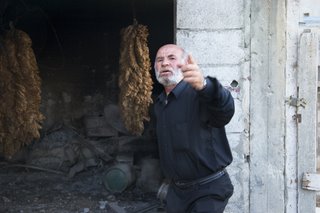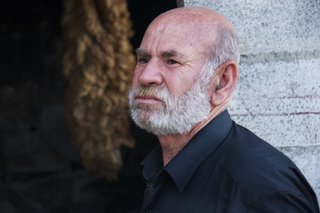Today we returned to Houla. From the village you can see the border with Israel. High on the hilltop you can see the Israeli surveillance towers. Israeli snipers fired on the village throughout the war. Bullet holes from a large caliber gun lined the exterior walls of the homes facing the hill. I was told the Israeli army suffered twelve deaths when ground forces tried to enter Houla. They withdrew and began shelling the village.
We met with a family who lost their mother on August 6th. The room in which she was killed faced the hillside. Each day she would make bread for her family who lived next door. Clearly the snipers watched this woman each day as she entered her kitchen. On the day she was killed she entered the kitchen as usual. A tank mortar followed closely behind her. Her brother tried to recover her body but was trapped in the room by the snipers for several hours, and finally had to leave unable to recover her body. It would be several days before the snipers relented and let her body be moved. She left behind five boys and a girl as well as her husband Yasser.
Now, Yasser stands in the doorway of the kitchen, pointing to the hillside and telling the story of his wife’s death. I realize that the Israeli army is most likely watching us from the home they still occupy high on the hillside. I wonder if a sniper has a bead on any of us. The eighteen-year-old daughter, Afaaf cheeks flush and tears well up in her eyes as her father recounts how her mom was killed. I cry too. Yasser ends by saying, “the Israeli’s killed 83 people in Houla when they created their state in 1948, and they continue to kill us today”.
For a minute we all stand silent, then turn and climb the steps. Yasser’s neighbor, Nader beckons us to his home across the street. The home was struck by a bomb on July 15th. He invites Mohammad and I into the house. The walls of the house are all buckled outwards, but somehow the house remains standing. In the entranceway I step over curtains and a sewing machine. Broken furniture, clothes, photographs, toys and papers lie scattered on the floor. The TV remains on the shelf, it’s screen blown out by shrapnel. We climb over the wreckage. On the 3rd day of the war, July 15th, Nader was in his home having dinner with fifteen relatives. A rocket fired from an Israeli jet entered through the front door. Nader points to where his wife Zainab was killed, as well as his sister Sabna. “Right there, we were gathered, eating”, he points to the broken bowls and food that lie scattered on the floor. Nader tells us that he pulled his relatives out of the house one by one, including his seven-month-old daughter and his severely injured brother. His brother remains hospitalized. It is obvious that since the bodies were removed, nothing else has been touched. Mohammad tells me it is OK to photograph, but I can’t- it feels profane. I tell him I can’t do it, it seems like sacred space. We turn and climb through the debris back to the street. Nader invites us next door, and we join him in the sitting room. He shows us pictures of his sister and his wife. We sit quietly, not saying anything. Nader’s pain and grief are etched in his face and his eyes express a sorrow that can’t be quantified. He is crying, but without tears. He sits cracking his knuckles, and rubbing his hands. He seems unsure what to do next. We take our leave. He thanks us for coming.
Kofe Annan also came to Houla today. He did not visit the home occupied by the soldiers, he did not visit with Yasser and his daughter, nor did he step into Nader’s tableau of pain. We asked a woman if she saw him in the village. She said, “Did he bring meat? He didn’t. I don’t care about Kofi Annan, the UN has done nothing for us.”
skip to main |
skip to sidebar


Whitehouse Arrest for Protesting the Occupation of Iraq (Sept 2005).



Sharon, Blair, Bush... Terrorists; Abu Dis (Mar 2005)

Balls to Walls; Abu Dis (Mar 2005)

Arrested Bringing a Coffin to Congress (Sept 2006)
All the universe is one bright pearl- we do not speak of two pearls or three pearls...your whole body is a radiant light. Your whole body is Mind in its totality...your whole body knows no hindrance. Everywhere is round, round, turning over and over.
Support My Work!

- Johnny
- i am a human rights activist, writer, photographer, and videographer. i have traveled to Afghanistan, Iraq, Lebanon, Jordan, Syria, and Palestine (the West Bank & Gaza), to bear witness and document the effects of war on communities and the struggle to retain human dignity in the face of oppression. i advocate for justice, reconciliation, and nonviolent strategies in the face of violence and oppression.

Whitehouse Arrest for Protesting the Occupation of Iraq (Sept 2005).



Sharon, Blair, Bush... Terrorists; Abu Dis (Mar 2005)

Balls to Walls; Abu Dis (Mar 2005)
Links

Arrested Bringing a Coffin to Congress (Sept 2006)
